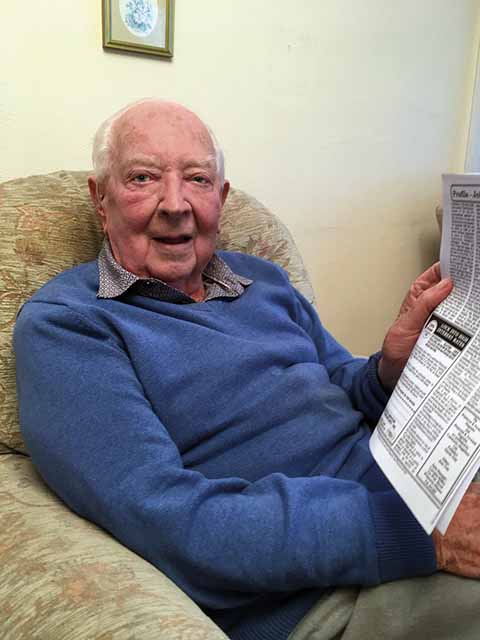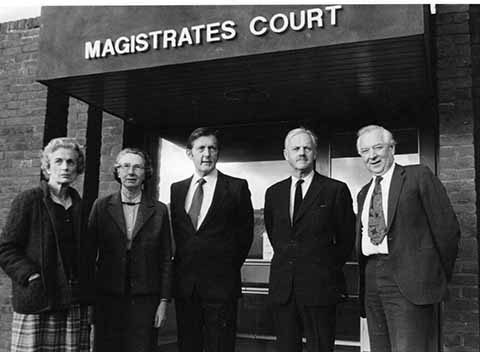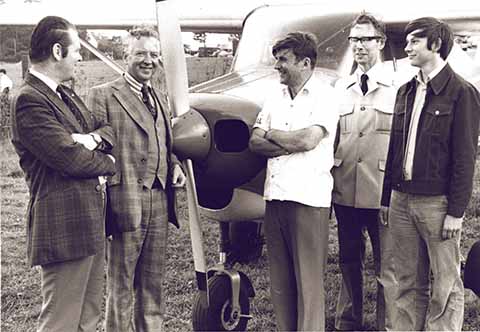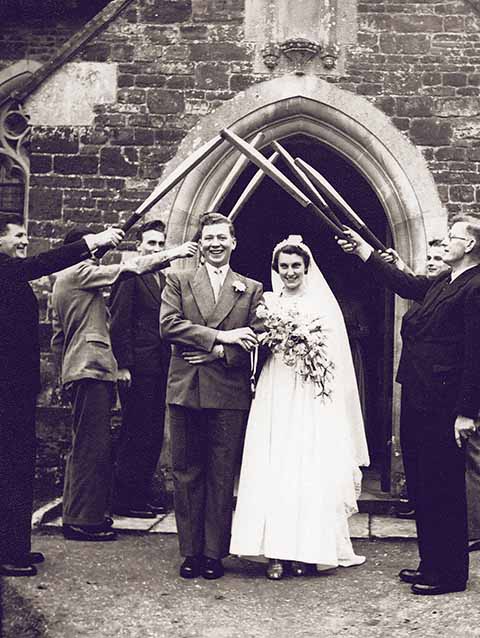Dorset Lives – Slow’s Law
Published in March ’19
It’s Christmas Eve in 1980s Wimborne and the season of goodwill is in full swing. But in one town centre building, the smiles have been wiped from some female faces. A dozen or so veterans of the Greenham Common peace camp have been summoned for not paying £50 fines imposed for cutting the fence around the cruise missile base. ‘The fines were transferred to me to enforce,’ recalls John Slow, the former magistrates’ clerk. ‘They came to court and said they were never going to pay and the magistrates gave them seven days’ imprisonment, suspended for 14 days. I waited until Christmas Eve, then police officers attended their homes and asked whether they wanted breakfast in Holloway or to pay the fine. Everyone paid.’
John Slow’s Christmas Eve courts were a legendary feature of life in my time as Wimborne district reporter for the Western Gazette and later the Bournemouth Evening Echo. Every 24 December, a succession of non-payers would appear in court to be given a choice – pay up or spend Christmas inside. It was all part of ‘Slow’s Law’, as we reporters called his eccentric style of courtroom management. Among colleagues he was known as the ‘Ken Dodd of the Justices’ Society’ on account of his humour. His courtroom methods were as entertaining as they were interesting – but they were also very effective. ‘I was able to do whatever I wanted to do. My purpose was to see that justice was done in Wimborne,’ says John. ‘My Christmas Eve non-payment of fine courts reaped wonderful rewards. Every single person paid their fines.’
Bail offered another opportunity for a little legal massage. ‘The government introduced quite a few conditions regarding bail but I had my own bail act,’ John admits. ‘Instead of imposing the normal conditions like reporting to a police station once a week and being home by 9pm, I asked them to give me £1000 and as long as they didn’t commit another offence in the meantime and turned up in court, they got their money back. The thought of losing £1000 concentrated their minds much better than reporting to a police station. It was a super system. Everyone was satisified and no-one was in prison. It worked.’
John’s ‘most infamous case’ (his words) concerned three Blandford teenagers, who decided to ‘have a giggle’ after coming across a hole in the road at Badbury Rings one dark November night. Red lights guarded the council roadworks but the boys moved the lights to the other side of the road and ran off to await the consequences of their work. Unfortunately for them, the first vehicle to arrive was a police car and they were caught red-handed. ‘The only charge that could be levied was obstruction of the highway, which carried a maximum fine of £2,’ says John. ‘The magistrates asked me what they could do. I said the defendants might be mentally ill so they could be remanded in custody for three weeks for medical reports. Of course, the reports found that they weren’t mental and after three weeks in custody they came back to court and were fined £2 each. But I bet they didn’t remove any more red lights.’
Another of John’s more memorable defendants was a serial bigamist, who combed the Echo’s will reports in search of men who had left a lot of money, then befriended the wealthy widow and eventually proposed marriage, followed by a world tour. ‘His life consisted of six months’ touring the world and twelve months in Dorchester Jail,’ says John. ‘He did this five times.’
A man arrested for drunkenness in Wimborne Square stepped into the witness box and took the oath. But instead of giving his name, he stood in silence for 30 seconds before announcing: ‘You be Flossy Luther’s son!’
‘My mother had taught him at Crichel School 40 years before,’ says John. ‘He didn’t know me, so how on earth he could recognise me from my mother’s features, I don’t know. It didn’t affect the verdict.’
The magistrates’ duties included the selection of other magistrates. One decided the best way to assess a prospective colleague’s true character was to dress up as a tea lady and see how they treated her. ‘Afterwards she reported to the panel. If was often different to what a candidate said when they appeared in person.’
A Dorset vicar’s wife, considered ‘immensely suitable’ to join the bench, was duly nominated to the Lord Chancellor. But he turned her down because she had thrown an egg at the Prime Minister many years earlier, when she was
aged 19.
John Slow is a Dorset man to the core. Born at Bear Cross, he was the son of a Merley farmer and the grandson of a Puddletown policeman and is a descendant of Kinson smugglers. He describes his life as a story of second choices. As a schoolboy he failed his 11-plus but later won a scholarship to Canford School, during which period he played hockey for Dorset and rugby for Hampshire. He later played cricket for Colehill.
The police would have been John’s first career choice, but tuberculosis put paid to that and instead he became a clerk at Bournemouth Magistrates’ Court, later moving to Oxford and Southend. Working in the mornings, attending law school in the afternoons and studying at home in the evenings and before work each morning, he qualified as a solicitor in 1964 and applied to become Clerk to the Justices at Gloucester. He was unsuccessful but instead landed the equivalent role at Wimborne, Blandford and Sturminster Newton in 1965 with a starting salary of £2500 a year and a staff of two. Shaftesbury and Gillingham were added to his portfolio in 1970, Christchurch in 1974, Wareham and Swanage in 1980 and Poole in 1984. By the time he retired in 1990, he had a staff of 98 covering half the county.
Over the years, John has been actively involved with numerous charities and social organisations and has been chairman, president or secretary of several, including Wimborne Rotary, Wimborne Christian Aid, Streets Meadow old people’s home, Wimborne Disabled Association and Wimborne Licensed Victuallers’ Association. For 25 years, he gave up two weeks of his own holiday time to take 24 Disabled Association members on vacation – voluntary work for which he was appointed MBE
in 2007.
Wearing his Rotary hat, John once organised an air show near Canford Magna and raised £8000 for a spina bifida charity. The show starred helicopters, hot air balloons, model aircraft and Tiger Moths, one of which flew between two rugby posts and cut a washing line strung between them. John has also been a lay preacher at Wimborne Methodist Church and director of a Swanage hotel, where he lived for five years before moving to his present home on the north bank of the River Stour just upstream from Canford Bridge at Wimborne. John and his Wimborne-born wife Molly’s twin daughters, Julie and Lind, also live at Merley. Their son, David, sadly died eleven years ago but John and Molly have five grandsons and four great-grandchildren. One grandson, brought up at Wimborne, was the highest achieving maths student in the country eighteen years ago and he is now a Professor of Mathematics in Rio de Janeiro, teaching Brazilian students in their
native Portuguese.
John’s humour has helped to make him a sought-after public speaker with a choice of four talks – Humour in Court, The A-Z of Magistrates’ Courts, Old Characters of Wimborne, and Disasters (personal and general). He has long been a devoted racing enthusiast and is a former racing correspondent of the Western Gazette and Sporting Life. His retirement gifts included a print of Lester Piggott, signed by the champion jockey in his prison cell! ‘To me, there is nothing more magnificent than the sight of twenty steeplechasers in action,’ says John. ‘At Sturminster Newton, two of the magistrates were racehorse owners so we had to finish our sessions by lunchtime so we could go to the races.’
When a Wimborne solicitor found himself on a careless driving charge, the case was moved to Sturminster to ensure the fair trial he might not have got in his home town. But he spoke for so long in his own defence that the magistrates had to adjourn into the afternoon. ‘The chairman had a runner in the 2.30 at Taunton,’ John recalls. ‘She missed the race. The defendant got four times the usual fine.’
John is now 88 and not in the best of health. ‘I have prostate cancer, diabetes, four stents in the heart, two hernias that they can’t operate on because I’m on warfarin, and a pulse that does whatever it wants to,’ he says. But he’s as active as ever and currently looks after tax and probate matters for twenty widows – ‘making sure they don’t get ripped off. One widow spoke to Wimborne Rotary Club about her memories on her hundredth birthday. ITV got hold of the story, took her to the Southampton studios and said her complexion was amazing and how did she do it. She said she had used Oil of Ulay since she was 18. Before she left the studio, they gave her a two-gallon can of it.’





